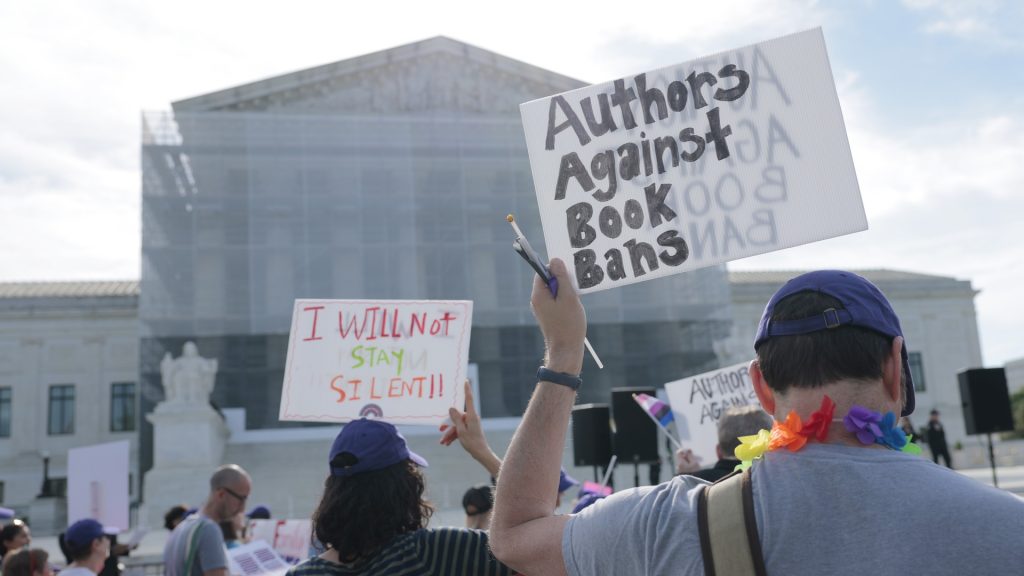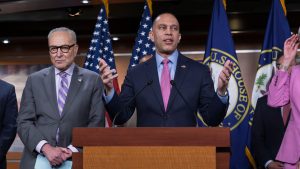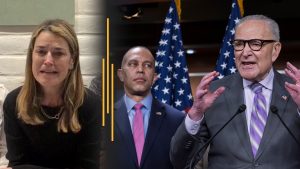School book bans reach record levels, PEN America report shows

Books tell stories, shape ideas and open windows to the world. But in the 2024–2025 school year, nearly 7,000 of those windows were slammed shut.
A new PEN America report found that across 23 states, books were removed from school shelves at a pace unprecedented in U.S. history.
Florida, Texas and Tennessee face the highest pressures to ban books that some adults find objectionable, but Pennsylvania, Michigan and Minnesota may follow.
PEN America’s report coincides with Banned Books Week, Oct. 5–11, a national observance focused on defending the right to read.
What does the report cover?
PEN America is a nonprofit organization that advocates for free expression, authors’ rights and access to information. It tracks book bans and other censorship efforts nationwide, highlighting threats to students’ ability to read freely and to educators’ authority in schools.
The removals spanned picture books, young adult novels and educational texts, which PEN American said affected thousands of students, educators and authors. Over the past four years, PEN America has tracked more than 22,800 banned texts in 451 school districts in 45 states.
The report says that banning books that feature diverse characters, identities and experiences sends a clear message — that some lives are less worthy of recognition than others.
Rudine Sims Bishop, a professor emerita at Ohio State University who has been called the “mother” of multicultural children’s literature, said that children denied representation in literature learn they are undervalued in society.
“Six million, three hundred forty-thousand nonwhite children are learning to read and to understand the American way of life [from] books which either omit them entirely or scarcely mention them,” she said.
Educators and researchers argue that book bans can impact students’ First Amendment rights to access information and reduce the range of available perspectives, thereby limiting students’ exposure to diverse ideas and potentially affecting how they develop critical thinking and form opinions.
According to PEN America, what started as occasional complaints or isolated challenges has now become a regular practice in many schools. Books were banned in at least 87 public school districts during the last academic year alone.
Groups fighting for bans
The political organization Moms for Liberty has become a key player in efforts to limit certain books in schools and libraries. It focuses on titles that explore LGBTQ+ experiences, racial justice and other topics related to diversity.
Local chapters across the nation often drive efforts to remove certain books from schools by submitting formal complaints and rallying community support for removal measures. Complaints often cite claims that minors could be exposed to obscenity, or they object to specific content related to race, equity or LGBTQ+ themes.
The movement to restrict access to books gained momentum from executive orders issued by President Donald Trump addressing “radical indoctrination” and “gender ideology.” Those orders have been cited to justify removing nearly 600 books from Department of Defense schools, according to PEN America.
Trump’s order on ending “radical indoctrination” directs federal agencies to limit funding for programs and curricula deemed to promote certain equity or gender ideologies, while emphasizing parental oversight in education.
At the same time, the Department of Education has removed positions tasked with investigating discriminatory book bans and issued guidance that discouraged discussion of race, identity and equity in schools.
While the orders do not explicitly ban individual titles, experts say that the combination of federal directives and agency guidance has contributed to a climate in which school administrators and educators may restrict materials.
State-level actions have further amplified book bans.
In South Carolina, a 22-title “no read” list could translate into nearly 1,800 separate district-level bans, while Utah’s similar approach creates sweeping restrictions across schools.
Meanwhile, lawmakers in Florida, Iowa and Missouri have passed laws requiring districts to remove library materials containing sexual content or other themes deemed controversial.
What defines a book ban?
PEN America counts a school book ban whenever a book is removed or restricted based on its content, whether due to parent complaints, administrative decisions or government pressure.
Bans include full removals, temporary reviews or restrictions by grade or parental permission.
In 2024–2025, 6,870 such bans were recorded. Florida led with 2,304 instances.
Nationally, 3,752 unique titles were affected. Some authors have faced repeated bans, a phenomenon PEN America calls the “Scarlet Letter” effect.
Most challenges to materials in schools and public libraries aren’t coming directly from parents. The American Library Association said about 72% of book challenges were pushed by groups and government-affiliated individuals, including elected officials, school board members and administrators.
Parents accounted for roughly 16% of challenges, while individual library users made up just 5%.
Notably, the 120 books most frequently targeted in 2024 were all listed on partisan book rating sites.
Content most at risk
According to the American Library Association, the most frequently challenged books in 2024 included titles such as “All Boys Aren’t Blue” by George M. Johnson, “Gender Queer” by Maia Kobabe, “The Bluest Eye” by Toni Morrison and “The Perks of Being a Wallflower” by Stephen Chbosky.
Many of these books feature LGBTQ+ characters, explore racial and social justice issues or examine gender identity. Due to book bans or restrictions, nearly 2,600 creators were affected in 2024–2025, including 2,308 authors, 243 illustrators and 38 translators.
Resistance emerges
In 70 of the 87 impacted school districts where book bans occurred last year, parents, students, librarians and educators have joined with local and national groups to voice their opposition.
The ACLU, EveryLibrary, Authors Against Book Bans and state Freedom to Read projects have all challenged restrictions and attempted to return books to shelves.
Independent voices have also spoken out about the growing wave of restrictions.
“PEN America’s 2024-2025 report on book censorship is as essential as it is chilling,” said Philomena Polefrone, associate director of American Booksellers for Free Expression. “It meticulously shows how federal actions and Supreme Court decisions have legitimized what should be unthinkable, especially in the United States: the attempt to control thought by restricting what books people can access in public institutions.”
The post School book bans reach record levels, PEN America report shows appeared first on Straight Arrow News.





